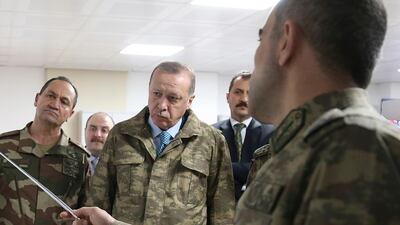The United States on Thursday delivered its strongest warning yet that Turkey should abandon its offensive in northern Syria, saying Ankara's actions could be deepening the country's civil war.
As Turkish forces conducted heavy operations in the Kurdish enclave of Afrin, US president Donald Trump also intervened, while casualties mounted.
He expressed his concerns about the Afrin operation during a phone call with Turkish president Recep Tayyip Erdogan on Wednesday.
But with Turkey attacking the YPG for a sixth day, a Syrian Kurdish militia allied with the US against ISIL, other American security officials were more explicit.
Turkey "ought to be mindful of the potential for escalation as they move into Syria and Afrin," said Tom Bossert, assistant to Mr Trump for homeland security and counterterrorism, urging its troops to leave and focus on "longer-term strategic goals".
While the offensive so far has centred on territory near the city of Afrin, Turkish officials have threatened to expand the operation to other parts of northern Syria, including areas where US troops are present.
Mr Bossert said it would be a "terrible outcome" if Turkish troops clashed with "the proxy forces that we have all been relying on to defeat ISIL, especially if there are US advisers in the region".
"There could be grave consequences to any miscalculation and escalation," Mr Bossert added.
_______________
Read more:
Syrian incursion demonstrates Ankara's widening gulf with the West
Vienna talks 'last hope' for Syria
Turkey offensive in Syria is a barometer for the unfolding conflict
_______________
Both the US and Turkey are members of Nato, and Turkish prime minister Binali Yildirim accused the US of betraying an ally.
"It is astounding and unacceptable ... that a country which is supposed to protect Nato's borders is giving open support to armed entities that target our borders," Mr Yildirim said.
The Syrian government has also been critical of the Turkish incursion, threatening last week to shoot down planes that enter its airspace. So far, however, it has declined to interfere militarily.
“The Turkish invasion is an open violation against the sovereignty of Syria,” Syrian deputy foreign minister Faisal Mekdad told the BBC. "We shall act accordingly. I will not specify any action, but Syria has the right to defend itself."
Turkey considers the YPG a terrorist group because of its links to the Kurdistan Workers’ Party (PKK), a militant Kurdish separatist group that has fought Ankara's government since the 1980s.
Residents of Afrin told The National they are preparing for a siege as Turkish artillery and aircraft continue to bombard the area. All roads out have been cut.
Thousands have been displaced and are moving further away from destroyed villages on the edge of the Kurdish-controlled area and toward the city of Afrin, witnesses said.
Afrin is surrounded on all sides by hostile forces – either Turkey itself, territory controlled by Turkish-backed Syrian rebel groups, or the government in Damascus. Turkish bombing near a dam north of the city on Tuesday stoked residents’ fears that Ankara's military was seeking to cut off vital supplies, including water.
The Syrian Observatory for Human Rights, which monitors the conflict, reported on Thursday that at least 32 civilians have been killed so far in the fighting, along with at least 42 YPG fighters and 48 members of Turkish-backed Syrian Arab militias who are leading the ground assault.
Earlier this week, Turkey’s foreign minister also raised the possibility of opening a new front against Kurdish militants – this time against PKK fighters in northern Iraq.
"One of the issues we have discussed with Iraq is a joint operation against the PKK's presence in Sinjar province. They told us 'PKK is no different from Daesh, let's cooperate against this threat,'" foreign minister Mevlut Cavusoglu told the Turkish daily Hurriyet after he met with Iraqi foreign minister Salim Al Jabouri on January 21 in Baghdad.
Turkey has launched operations in Iraq against the PPK in the past. And though it has largely been limited to airstrikes, thousands of its troops did briefly invade northern Iraq in 2008.
Prior to ISIL's takeover of large parts of Iraq in 2014, the PKK were largely confined to bases in the mountainous region of Qandil, which Iraq, Iran and Turkey all border.
When ISIL threatened Iraq's Kurdish-controlled provinces, including the Iraqi Kurdish capital of Erbil, PKK fighters left their mountain redoubt to provide support for the Kurdish Regional Government's forces. That support was critical to stopping ISIL's advance, but also provided the group a larger area of operations than it has enjoyed at any time in its history, straddling the borders between northern Syria and Iraq.
The Turkish foreign ministry and Iraqi foreign ministries did not immediately respond to requests for comment on Thursday on the possibility of such an operation.

